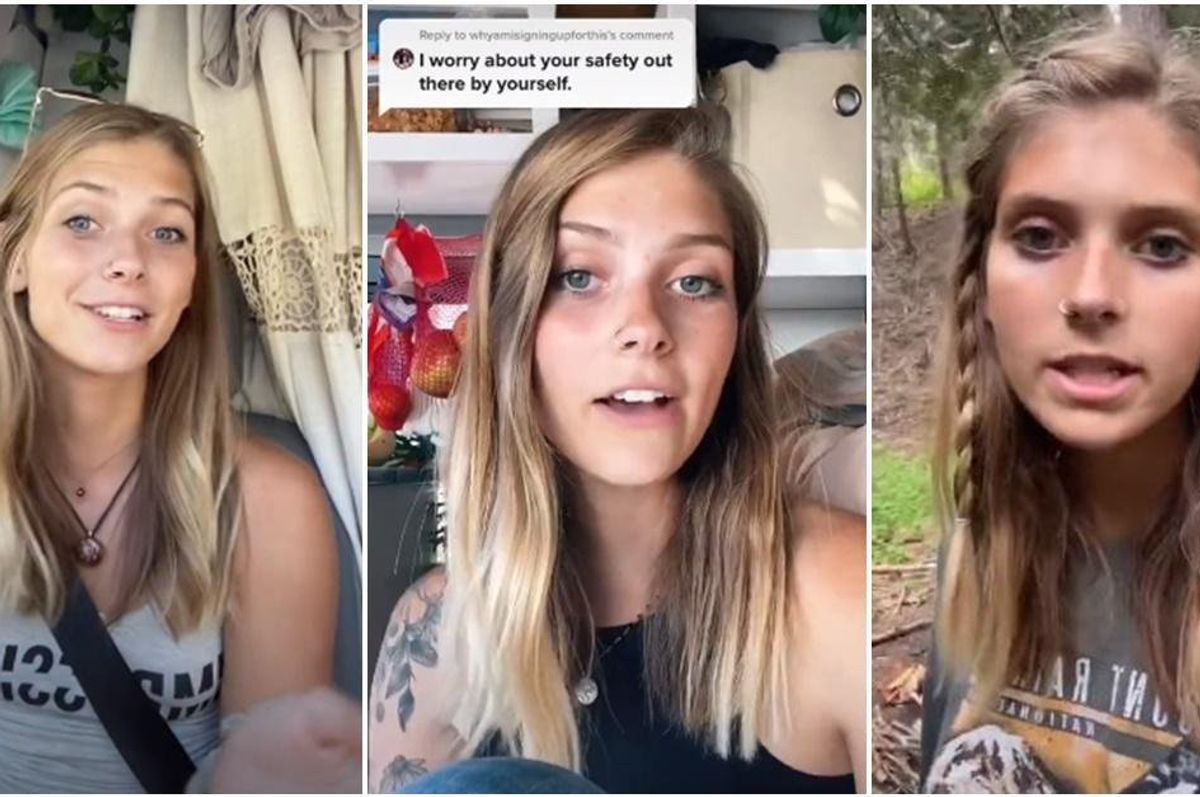20-year-old nomad who lives in a van shares how she lives the good life while staying safe
Here's some tips for giving it all up and living on the road.
Abigail Martin shares what life is like living in a van.
Do you ever fantasize about quitting your job, moving out of your place, and living life on the road? Seems impossible, right? How do you make money? How do you stay safe? How do you survive without all of the creature comforts you're accustomed to?
Abigail Martin, a 20-year-old photographer and social media influencer, has taken that giant leap into the unknown by buying a conversion van and taking it on the road. On her TikTok page, she shows people what nomadic life is like and how anyone can join her. It all started when she was in high school and started watching #VanLife videos online. By the time she graduated, she had no interest in going to college or joining the rat race.
So she worked four jobs until she saved up $18,000 to purchase a 2017 Ford Transit with 54,000 miles on it. It cost an extra $10,000 to install a bed, a kitchen, and to set up the electrical. "In the morning, I would work at a coffee shop from 6 a.m. to noon, then I would walk across the street to a boutique from noon to 6 p.m," she told The New York Times. "Then I'd go waitress at a restaurant from 6 p.m. until closing. On off-days, I was running my own photography business."
Abigail bought her van during the height of lockdowns and used her TikTok page to connect with people when we were all forced to stay apart. Now, her page has over 730,000 followers, and her videos have 18.3 million likes.
If you've ever dreamed of dropping out and living life on the road, here are a few videos we've selected from Abigail's page to get you started.
How does the electricity work?
@abigailmartiin How i have electricity in my van!! #vanlife #fyp #climber #washingtoncheck #vanconversion #foryoupage #vanbuild #outdoors #travel #hiking
How does she use the restroom?
@abigailmartiin How i go potty 🕺🏼 #vanlife #vanconversion #fyp #adventure #travel #toilet #camping #foryou
How does she shower?
@abigailmartiin see i’m not a dirtbag 100% of the time ;) #vanlife #fyp #caravanning #vanbuild #solofemaletraveler #camping #adventure #travel
How does she make money?
@abigailmartiin Reply to @ihave.6babydaddies i do work & heres how! #vanlife #buslife #travel #fyp #solofemaletravler #photographer #adventure #camping
How does she stay safe?
@abigailmartiin Reply to @whyamisigningupforthis How i stay safe! #vanlife #vanbuild #solofemaletraveler #solofemalevanlife #outdoors #travel #fyp
How to identify a sketchy campsite.
@abigailmartiin fun times as a solo female :))) #vanlife #solofemalevanlife #adventuredog #fyp #travel #pnw
What's her morning routine like?
@abigailmartiin a morning in a van. #vanlife #fyp #travel #camping #vanconversion #solofemaletraveler #adventure #foryou #morningroutine #breakfast #coffee
Abigail shares her greatest realization.
@abigailmartiin here’s your daily existential crisis :) go live yo life #motivational #fyp #vanlife #travel #adventure #inspirational #solofemaletraveler
"I think my greatest realization in life, one of the most freeing thoughts is that nobody gives a f**k what you're doing. Literally nobody cares. Everyone is too wrapped up in their own problems, their own achievements, their own goals, their own selves to give a f**k what you're doing," Abigail shares as her greatest realization about van life. "Nobody actually cares how skinny you are or how not skinny you are. Nobody cares if you're going to college or not or if you just decide to drop off the face of the earth. Nobody actually cares. So go do what you want."
This article originally appeared four years ago.
- Does anyone age better than 93-year-old Dick Van Dyke? Nope. ›
- My family of 5 traveled the U.S. for nearly a year, and it cost us less than staying home ›
- 20-year-old nomad who chooses to live in a van shares how she stays safe and thrives on the road ›
- Woman living in her car for 600 days has zero regrets. Here's how she does it. - Upworthy ›
- A woman over 50 turned her van into a serene 'tiny home' and has lived in it for 3 years - Upworthy ›

